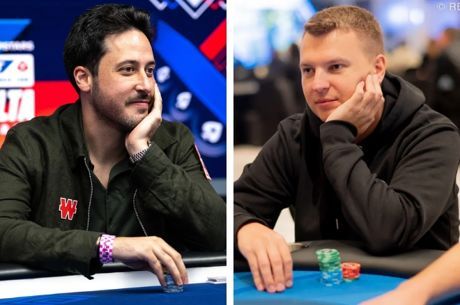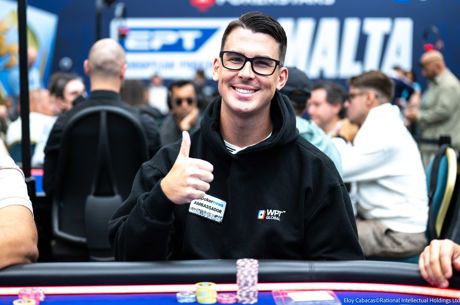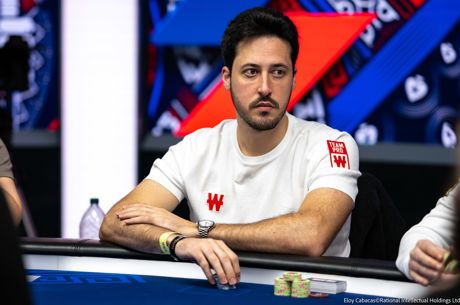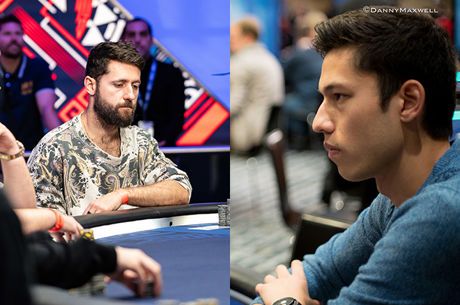Three-Handed Tournament Strategy with Eric Baldwin, Part 1

In 2009, Eric “basebaldy” Baldwin had a breakout year. During the World Series of Poker, he won his first bracelet in Event No. 34, a $1,500 buy-in no-limit hold’em event, and also finished third in the $10,000 World Championship pot-limit hold’em event. In his short career, he’s accumulated more than $2.6 million in winnings.
To win in any tournament, players must be skilled at playing shorthanded, all the way down to heads up. The UB Pro sat down to talk with PokerNews about this week’s concept: Three-handed tournament strategy.
Let’s first take a look at each position in three-handed tournament play. On the button, how are you tailoring your play, considering stack sizes and the types of players in the blinds?
If there are aggressive players in the blinds and they have a good stack size to reraise with, I'm definitely tightening up my raising range. In some situations I will only open if I'm willing to go all the way with the hand preflop.
It can be aggravating to pick up small pairs and suited connectors here, because you don't really want to get them all-in preflop, but your opponents are going to make it difficult to see a flop.
In that case, could you make an argument for limping?
I'll occasionally throw in a limp with these hands if my opponents have too much to shove. If they complete the small blind and/or check the big blind, I get to see a flop with a good hand in position. If they raise, I can call, expecting them to bet most flops, giving me a great opportunity to semi-bluff and pick up a nice pot if I flop something. Against observant opponents, it's important to limp monster hands as well to disguise your range.
It's a rare case in today's tournaments that I'd get three handed with two tight players. If I did, I would obviously be quite aggressive from the button, and be cautious if my opponents showed resistance.
OK, what about the small blind? Do you use some of the same principles for knowing when to raise into the big blind as you do when considering a raise on the button?
From the small blind I'm looking at what has happened in previous small blind versus big blind confrontations with this player. If I raised and got reraised last time, I'm very likely to raise again with most hands. This is because I expect him to think, "He knows I'm likely to reraise him here, and he's opening anyway,” and just give up most hands.
If I've been raising and taking down most pots and the player appears aggravated, I'm not raising very often at all until I pick up a good hand or I rebuild my image a bit. I really just ask myself, "How is this player likely to respond?" to each possible action. I do this before looking at my cards and act accordingly.
What spots are you looking to reraise from the small blind against a button raise, either as a resteal or for value?
I'm paying attention to how often this player has been raising their button. The more often they raise, the wider my range is to reraise on a resteal. Stack sizes are important here. If my opponent has a lot of chips, I need to be aware that my opponent might four-bet on a resteal or call my reraise. If I think there is a decent chance of my reraise getting called, I want to have a decent hand to go to the flop with.
Now onto the big blind. How do you approach this position?
If the button raises and the small blind folds, play is very similar to play from the small blind. One difference is I'm slightly more likely to call preflop, given the improved pot odds and knowledge that there is nobody behind me that can raise me off the hand. If the button folds, I'm back to examining previous small blind versus big blind confrontations against the small blind.
If he's been pretty weak with his small blind and comes in for a raise, I'm going to give him more credit than if he's opening most of the time. If he's really aggressive from the small blind, I need to mix in some resteals and calls more often. Three handed, most of the time, nobody is going to have that strong of a hand.
You can't sit around and wait to make big hands and expect to win. Finding ways to win pots without much of a hand is essential.
Do you think it’s possible to overexploit profitable plays from each of these positions?
It's definitely possible to overdo it with plays. This is where it's important to keep mixing up your play. If I've been stealing a lot and now all of the sudden I'm getting played back at, I need to adjust. The really good players can tell when they are about to get played back at. That's a much cheaper way to adjust your play than waiting for someone to actually reraise you.
So from any position, what are the biggest mistakes you see players making when it gets down to three-handed?
The biggest mistake I see is people relying too much on having or making a big hand.
Is there any other advice you would give to beginning players?
My best advice would be to assess the situation before worrying about your cards. Most of the time you can pretty accurately figure out what's going to happen before it does. Playing off these situation reads can be more important than the cards you're holding.
Later on this week, Baldwin will discuss how these concepts apply to an actual hand he played while three-handed for his WSOP bracelet this summer.
Be sure to follow us on Twitter for up-to-the-minute news.









